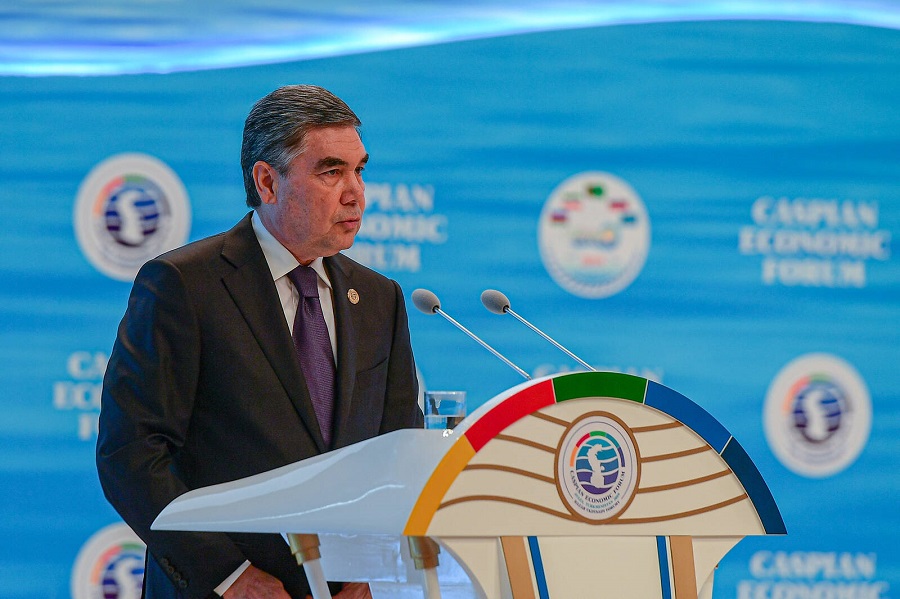Trade, investment ties and technologies within the Caspian region were the main theme in Turkmenistan last week at the inaugural Caspian Economic Forum.
“Both [Caspian] littoral states and other countries are centered on the Caspian region as it is a large natural source of hydrocarbon resources, a global transport and transit hub, and promising territory for expanding international trade,” President Gurbanguly Berdimuhamedow said at the event, according to reports by Turkmenistan Today.
The gathering, which lasted from August 11-12, saw more than 1,500 foreign officials and private sector professionals representing nearly 30 international organizations, in Avaza, a coastal resort city along the Caspian Sea. Azerbaijan’s Prime Minister Novruz Mammadov, his Russian and Kazakhstani counterparts, Dmitry Medvedev and Askar Mamin, as well as Iran’s Vice President Eshaq Jahangiri were in attendance.
The Caspian Sea region is considered one of the oldest oil-producing areas in the world with significant oil and natural gas reserves concentrated in both offshore and onshore deposits.
According to the United States Energy Information Administration, there were 48 billion barrels of oil and 292 trillion cubic feet of natural gas in proved and probable reserves within the Caspian basins as of 2013. The U.S. Geological Survey estimates another 20 billion barrels of oil and 243 trillion cubic feet of natural gas in as yet undiscovered, technically recoverable resources.
Russia’s prime minister says vast hydrocarbon reserves give all five states a geostrategic advantage, but they need to move on it and boost their economies also through non-oil industries.
“A modern economy is not limited with oil and gas production. Digital technologies, clean energy and rational use of natural resources, free movement of goods and services – these are what today make the country strong and competitive,” Dmitry Medvedev said while addressing the forum, according to reports by TASS.
Innovative technologies also came under the spotlight at the Caspian forum, when each country showcased recent national achievements.
AzerTelecom, the backbone internet provider which connects Azerbaijan to the international Internet network, was one of several Azerbaijani companies that took part at the Caspian Economic Forum in Avaza.
The company’s participation at the forum is no coincidence. Earlier this year AzerTelecom, which is the subsidiary of the country’s first mobile operator - Bakcell, launched "Azerbaijan Digital Hub" program, which is meant to turn Azerbaijan into a regional digital hub. AzerTelecom is looking to make Azerbaijan a link between the Caucasus, the Middle East, Central and South Asia, improving access to the Internet and digital services for 1.8 billion people.
AzerTelecom recently entered into an agreement with Kazakhstani Transtelecom and KazTransCom to build a fiber-optic cable line stretching over nearly 400 km (249 mi) along the bottom of the Caspian Sea, which will help increase regional capacity and global connectivity. The initiative is a part of the Trans-Caspian ambitious project implemented by AzerTelecom within its “Azerbaijan Digital Hub” program.
Foreign entrepreneurs and investors in attendance also visited an automobile exhibition headlined “Turkmen Sahrasy – 2019,” which featured world-famous car brands such as Bentley, Lamborghini, BMW, Audi, Toyota, Lexus, Hyundai and many others. Regional car brands were also showcased in Turkmenistan, including Russia’s Aurus – an armored limousine developed by Russia’s Central Scientific Research Automobile and Automotive Engines Institute.
Meanwhile, the two-day forum reportedly resulted in more than $380 million in trade deals, after Turkmenistan-made goods, including petrochemicals, were bought by entrepreneurs from Russia, Turkey, the United States, Singapore, and other countries. Participants inked 57 documents covering multiple fields, such as information technologies, trade, transportation and agriculture, for an undisclosed fee.







 Azerbaijan and Armenia started the process of demarcation of their border on Tuesday, with the installation of the first border markers based on ge...
Azerbaijan and Armenia started the process of demarcation of their border on Tuesday, with the installation of the first border markers based on ge...
 Armenian sappers commenced on Monday mine-clearance operations in the territories adjacent to the Saint Mary Church in village of Voskepar (Armenia...
Armenian sappers commenced on Monday mine-clearance operations in the territories adjacent to the Saint Mary Church in village of Voskepar (Armenia...
 Iran and Pakistan have signed eight cooperation documents in various fields, and agreed to strengthen ties to fight terrorism in the region.
Iran and Pakistan have signed eight cooperation documents in various fields, and agreed to strengthen ties to fight terrorism in the region.
 President Aliyev emphasized the critical role of the North-South Transport Corridor in fostering transport cooperation between Azerbaijan and Russi...
President Aliyev emphasized the critical role of the North-South Transport Corridor in fostering transport cooperation between Azerbaijan and Russi...



